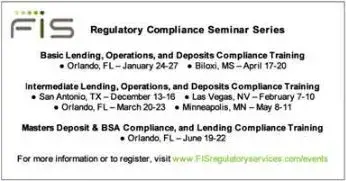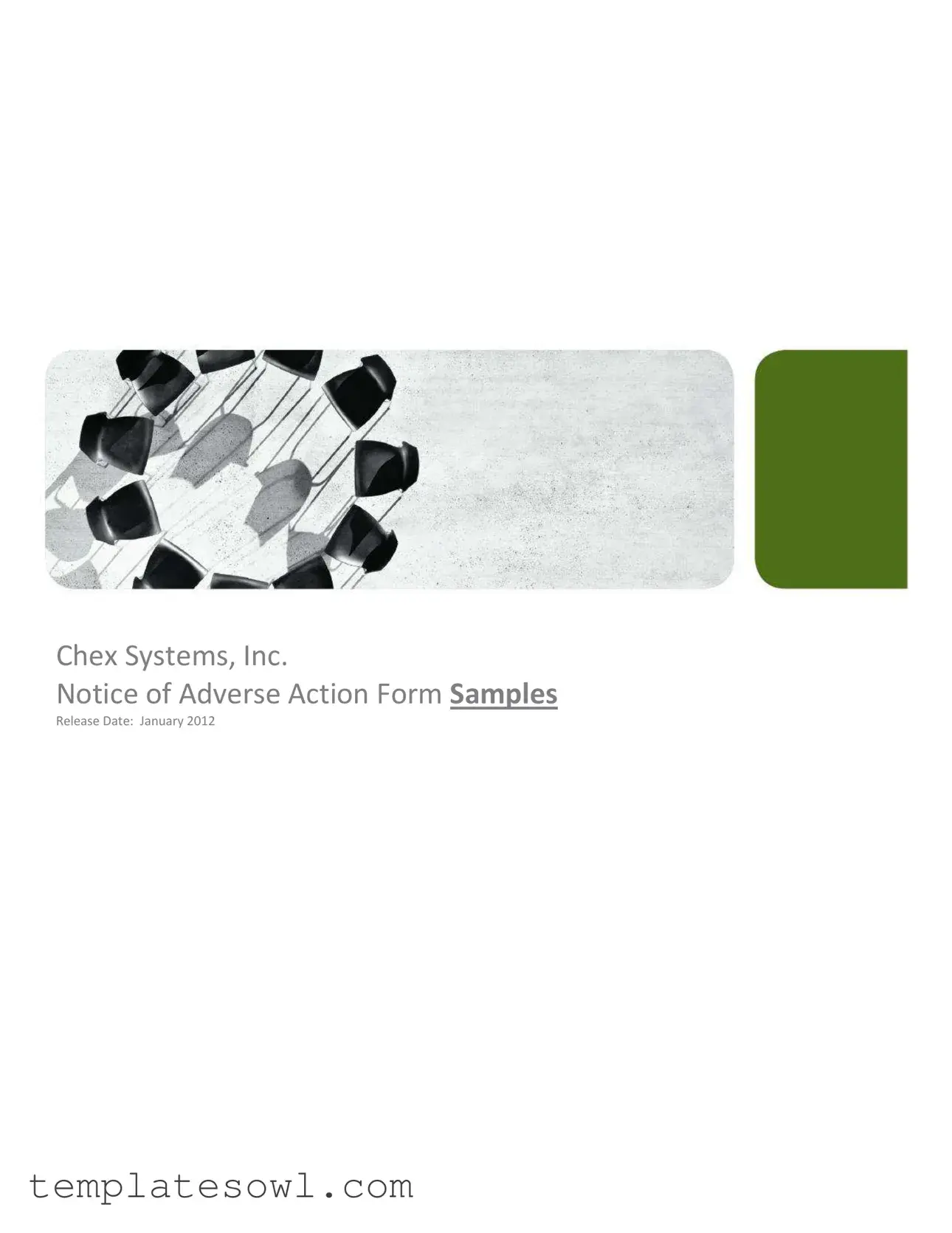Fill Out Your Adverse Action Form
The Adverse Action form serves as a critical tool for financial institutions when a decision is made to deny a consumer's application for a deposit account or similar services. This form not only communicates the institution's decision but also outlines the basis for this action, which often includes information from consumer reporting agencies like ChexSystems. It incorporates essential details such as the consumer's credit score and the key factors that influenced the score, enhancing transparency in the decision-making process. Under the Fair Credit Reporting Act, consumers are informed of their rights to obtain a copy of their report and dispute any inaccuracies, promoting consumer protection. Furthermore, the form is particularly relevant in the context of regulatory compliance, as it addresses obligations under laws like the Dodd-Frank Act, even as institutions maintain the responsibility to ensure their procedures align with current regulations. While ChexSystems provides sample forms, these templates are not one-size-fits-all solutions; each institution must adapt the form to its specific operational needs while considering legal liabilities. Familiarity with the Adverse Action form is imperative for both financial institutions and consumers, as it plays a pivotal role in fostering fair lending practices and maintaining trust in the financial system.
Adverse Action Example

Chex Systems, Inc.
Notice of Adverse Action Form Samples
Release Date: January 2012

Do you need compliance assistance at the tip of your fingers?
An annual subscription with FIS Regulatory Advisory Services helps you tackle the daily challenges of compliance. As your trusted compliance advisor, we want to make your life easier by providing you with the
most honest, accurate, timely and practical advice possible, and keeping you up to date in the
trusted by regulated financial institutions and examiners alike!
By signing up today, you will have access to:
Unlimited access to our regulatory compliance experts via the hotline or
Unlimited access to our scheduled webinars on hot topics for three institution users
Unlimited access to our Web site for your entire institution, which includes the Big Orange Book, and other tools like our Mortgage Loan Disclosure Calculator, Compliance Timeline, Sample Policy Manual and much more!
Three hard copies of the Big Orange Book & Quick Reference Guides (updates and new guides at no additional cost throughout the year)
Discounts on educational seminars for any attendee you send
*Contact us for special promotional pricing!
(Regular Price is $4,995)
Call us at (866) 355 - 5150 or
email us at compliance.solutions@fisglobal.com
So what are you waiting for?!
Sign up today!
*Existing Regulatory Service customers can take advantage of this offer depending on renewal dates and subscription level
(i.e. Premium Member, Website Only, BOB only Subscriber). Offer only valid for a new or renewing subscription, and cannot be used on an existing contract.
Please contact Catherine Livingston at (800)
Want More Information? |
|
Visit us on the web at: |
|
www.FISregulatoryservices.com |
|
|
|
CONFIDENTIAL |
2 | P a g e |
Chex Systems, Inc. Notice of Adverse Action Form Samples (Release Date: January 2012) |
|
Copyright © 2012 Fidelity National Information Services and/or its subsidiaries. All Rights Reserved. |
|

INFORMATION ABOUT THIS DOCUMENT |
|
As a o e ie e, Che “ ste s, I . ChexSystems |
a pro ide or other ise ake a aila le to its |
customers certain sample adverse action forms, procedures, or other similar information (collectively, Materials . ChexSystems customers acknowledge and agree that the Materials were created for general
application and have not been customized to address usto ers’ specific business operations. ChexSystems does not guarantee that the Materials will comply with any applicable laws, rules or regulations, and the customer is responsible for its use of Materials and bears sole liability for any such use.
Samples in this document include:
1.ChexSystems Adverse Action Notice, without Credit Score Disclosure
2.ChexSystems Adverse Action Notice, with Credit Score Disclosure
3.ChexSystems, plus Credit Bureaus Adverse Action Notice, with Credit Score Disclosure
CHEXSYSTEMS POSITION ON THE CREDIT SCORE DISCLOSURE REQUIREMENT
ChexSystems is not taking a position on whether or not its customers are required to provide the Credit Score Disclosure to declined account applicants; rather, each financial institution is responsible for making this determination on its own behalf. As a convenience to its customers that elect to provide the Credit Score Disclosure to declined account applicants, ChexSystems is now making available the data fields necessary to support the Credit Score Disclosure requirements set forth by the
Chex Systems, Inc. (herein ChexSystems) is a consumer reporting agency and
an indirect wholly owned subsidiary of Fidelity National Information Services, Inc.
CONFIDENTIAL |
3 | P a g e |
Chex Systems, Inc. Notice of Adverse Action Form Samples (Release Date: January 2012) |
|
Copyright © 2012 Fidelity National Information Services and/or its subsidiaries. All Rights Reserved. |
|

Notice of Adverse Action
Notice Date:
We are sorry but we are unable to accommodate your request to open a deposit account with our institution at this time. Our decision was based in whole or in part on information obtained in a report from the consumer reporting agency listed below. You have a right under the Fair Credit Reporting Act to know the information contained in your file at the consumer reporting agency. The reporting agency played no part in our decision and is unable to supply specific reasons why we have denied your request to open a deposit account in our institution. You also have a right to a free copy of your report from the reporting agency, if you request it no later than 60 days after you receive this notice. In addition, if you find that any information contained in the report you receive is inaccurate or incomplete, you have the right to dispute the matter with the reporting agency.
Chex Systems, Inc.
Attn: Consumer Relations
7805 Hudson Road, Suite 100
Woodbury, MN 55125
Telephone:
Fax:
Web: www.consumerdebit.com
If you have any questions regarding your consumer report, you should contact the consumer reporting agency using the contact information above.
If you have any other questions regarding this notice, you should contact:
Institution name:
Institution address:
Institution
As a convenience, Chex may provide or otherwise make available to Client certain sample adverse action forms, procedures, or other similar information (collectively,
Materials ). Clie t a k o ledges a d agrees that the Materials ere reated for ge eral appli atio a d ha e ot ee usto ized to address Clie t’s spe ifi business operations. Chex does not guarantee that the Materials will comply with any applicable laws, rules or regulations, and Client is responsible for its use of Materials and bears sole liability for any such use.
CONFIDENTIAL |
4 | P a g e |
Chex Systems, Inc. Notice of Adverse Action Form Samples (Release Date: January 2012) |
|
Copyright © 2012 Fidelity National Information Services and/or its subsidiaries. All Rights Reserved. |
|

Notice of Adverse Action
Notice Date:
We are sorry but we are unable to accommodate your request to open a deposit account with our institution at this time. Our decision was based in whole or in part on information obtained in a report from the consumer reporting agency listed below. You have a right under the Fair Credit Reporting Act to know the information contained in your file at the consumer reporting agency. The reporting agency played no part in our decision and is unable to supply specific reasons why we have denied your request to open a deposit account in our institution. You also have a right to a free copy of your report from the reporting agency, if you request it no later than 60 days after you receive this notice. In addition, if you find that any information contained in the report you receive is inaccurate or incomplete, you have the right to dispute the matter with the reporting agency.
Chex Systems, Inc.
Attn: Consumer Relations
7805 Hudson Road, Suite 100
Woodbury, MN 55125
Telephone:
Fax:
Web: www.consumerdebit.com
We also obtained your credit score from this consumer reporting agency and used it in making our credit decision. Your credit score is a number that reflects the information in your consumer report. Your credit score can change, depending on how the information in your consumer report changes.
Credit Score: |
|
Score Date: |
Scores range from a low of 100 to a high of 9999
Key factors that adversely affected your credit score (insert here the four key factors that adversely affected the credit score or if the number of recent inquiries is a key factor, insert five key factors including the number of recent inquiries):
If you have any questions regarding your credit score, you should contact the consumer reporting agency using the contact information above.
If you have any other questions regarding this notice, you should contact:
Institution name:
Institution address:
Institution
As a convenience, Chex may provide or otherwise make available to Client certain sample adverse action forms, procedures, or other similar information (collectively,
Materials ). Clie t a k o ledges a d agrees that the Materials ere reated for ge eral appli atio a d ha e ot ee usto ized to address Clie t’s spe ifi
business operations. Chex does not guarantee that the Materials will comply with any applicable laws, rules or regulations, and Client is responsible for its use of Materials and bears sole liability for any such use.
CONFIDENTIAL |
5 | P a g e |
Chex Systems, Inc. Notice of Adverse Action Form Samples (Release Date: January 2012) |
|
Copyright © 2012 Fidelity National Information Services and/or its subsidiaries. All Rights Reserved. |
|

Notice of Adverse Action
Notice Date:
We are sorry but we are unable to accommodate your request to open a deposit account with our institution at this time. Our decision was based in whole or in part on information obtained in a report from one or more of the consumer reporting agencies listed below. You have a right under the Fair Credit Reporting Act to know the information contained in your file at the consumer reporting agency. The reporting agency played no part in our decision and is unable to supply specific reasons why we have denied your request to open a deposit account in our institution. You also have a right to a free copy of your report from the reporting agency, if you request it no later than 60 days after you receive this notice. In addition, if you find that any information contained in the report you receive is inaccurate or incomplete, you have the right to dispute the matter with the reporting agency.
|
|
ChexSystems |
|
|
Experian |
|
|
Equifax |
|
|
Trans Union |
|
|
|
|
|
|
|
|
||||
|
|
|
|
|
|
|
|
|
|
|
|
|
|
|
|
|
|
|
|
|
|
|
|
Chex Systems, Inc. |
Experian |
Equifax Credit Information Services |
TransUnion Consumer Relations |
||||||||
Attn: Consumer Relations |
PO Box 2002 |
PO Box 740241 |
PO Box 1000 |
||||||||
7805 Hudson Road, Suite 100 |
Allen, TX 75013 |
Atlanta, GA 30374 |
Chester, PA 19022 |
||||||||
Woodbury, MN 55125 |
|
|
|
|
|
|
|
|
|
||
|
|
|
Telephone: |
Telephone: |
Telephone: |
||||||
Telephone: |
Web: |
|
|
|
Web: |
||||||
Fax: |
www.experian.com/reportaccess |
|
|
|
www.transunion.com/myoptions |
||||||
Web: www.consumerdebit.com |
|
|
|
|
|
|
|
|
|
||
|
|
|
|
|
|
|
|
|
|
|
|
To contact ChexSystems in |
If you prefer to use a mailed |
To contact Equifax in writing, |
If you prefer to mail a request, |
||||||||
writing, forward your request |
request, send the following |
forward your request including |
please provide your first name, |
||||||||
including your full name, |
information to Experian: your full |
your name, address, former |
last name, middle initial, current |
||||||||
including middle initial, current |
name, including middle initial and |
address (if you have been at your |
address, Social Security number, |
||||||||
address, US Social Security |
generation such as SR, JR, II, etc.; |
current address less than two |
date of birth, any previous |
||||||||
number, date of birth and any |
current mailing address; Social |
years), Social Security Number |
addresses used in the past five |
||||||||
previous addresses used in the |
Security number; date of birth; |
(required) and the name of the |
years (include any PO Boxes). |
||||||||
last five years (including PO |
previous addresses for the past |
company that referred you to |
|
|
|
||||||
Boxes). |
two years; and two proofs of your |
Equifax. |
|
|
|
||||||
|
|
|
current mailing address, such as |
|
|
|
|
|
|
||
|
|
|
dri er’s li e se, utilit ill, a k or |
|
|
|
|
|
|
||
|
|
|
insurance statement, etc. |
|
|
|
|
|
|
||
As a convenience, |
Chex may provide or otherwise make available to Client certain sample adverse action forms, procedures, or other similar information (collectively, |
Materials ). Clie |
t a k o ledges a d agrees that the Materials ere reated for ge eral appli atio a d ha e ot ee usto ized to address Clie t’s spe ifi |
business operations. Chex does not guarantee that the Materials will comply with any applicable laws, rules or regulations, and Client is responsible for its use of Materials and bears sole liability for any such use.
Sample Form Continues on Next Page….
CONFIDENTIAL |
6 | P a g e |
Chex Systems, Inc. Notice of Adverse Action Form Samples (Release Date: January 2012) |
|
Copyright © 2012 Fidelity National Information Services and/or its subsidiaries. All Rights Reserved. |
|

We also obtained your credit score from this consumer reporting agency and used it in making our credit decision. Your credit score is a number that reflects the information in your consumer report. Your credit score can change, depending on how the information in your consumer report changes.
Credit Score: |
|
Score Date: |
Scores range from a low of 100 to a high of 9999
Key factors that adversely affected your credit score (insert here the four key factors that adversely affected the credit score or if the number of recent inquiries is a key factor, insert five key factors including the number of recent inquiries):
If you have any questions regarding your credit score, you should contact the consumer reporting agency using the contact information above.
If you have any other questions regarding this notice, you should contact:
Institution name:
Institution address:
Institution
As a convenience, Chex may provide or otherwise make available to Client certain sample adverse action forms, procedures, or other similar information (collectively,
Materials ). Clie t a k o ledges a d agrees that the Materials ere reated for ge eral appli atio a d ha e ot ee usto ized to address Clie t’s spe ifi business operations. Chex does not guarantee that the Materials will comply with any applicable laws, rules or regulations, and Client is responsible for its use of Materials and bears sole liability for any such use.
Contact Us |
For more information about Risk, Fraud, and Compliance Solutions |
|
|
MoreInfo@fisglobal.com |
|
|
or visit us on the Web: |
|
CONFIDENTIAL |
7 | P a g e |
Chex Systems, Inc. Notice of Adverse Action Form Samples (Release Date: January 2012) |
|
Copyright © 2012 Fidelity National Information Services and/or its subsidiaries. All Rights Reserved. |
|
Form Characteristics
| Fact Name | Description |
|---|---|
| Release Date | The Chex Systems Notice of Adverse Action Form was released in January 2012. |
| Purpose | This form informs applicants about the denial of their deposit account requests based on information from a consumer reporting agency. |
| Compliance Rights | Under the Fair Credit Reporting Act, individuals have the right to know what information led to the adverse action. |
| Credit Score Disclosure | Institutions are not required to provide the Credit Score Disclosure but may do so if they choose. |
| Data Accessibility | ChexSystems provides the necessary data fields for compliance with the Dodd-Frank Act regarding Credit Score Disclosure. |
| Consumer Interaction | Applicants can request a free copy of their report within 60 days of receiving an adverse action notice. |
| Key Factors | The form includes space for listing key factors that negatively affected the applicant's credit score. |
| Consumer Reporting Agency | ChexSystems is a consumer reporting agency and operates under the regulatory framework applicable to such entities. |
| Liability Disclaimer | ChexSystems states that its sample forms may not comply with all applicable laws and clients are responsible for their use. |
Guidelines on Utilizing Adverse Action
Filling out the Adverse Action form is a straightforward process that ensures compliance with necessary regulations. Be prepared to have specific information ready, such as agency details and credit score data. This form serves as a critical communication tool for informing individuals about decisions made regarding their requests for deposit accounts.
- Enter the date on which the notice is being completed.
- Provide a clear statement indicating that the institution is unable to accommodate the request.
- Specify the basis for the decision, noting that it was based on information obtained from the consumer reporting agency.
- Mention the consumer reporting agency by name and provide their contact information (including telephone and web address).
- Include a statement about the individual’s rights under the Fair Credit Reporting Act, including the right to obtain a free copy of their report.
- If applicable, provide the credit score and the date it was obtained.
- List the key factors that adversely affected the individual’s credit score, typically four or five factors.
- Finally, include the institution's name, address, and toll-free telephone number.
What You Should Know About This Form
What is the purpose of the Adverse Action form?
The Adverse Action form is used by financial institutions to notify applicants when their request to open a deposit account has been denied. This form outlines the reasons for the denial, specifically referencing any information obtained from consumer reporting agencies that influenced the decision. It also informs the applicant of their rights under the Fair Credit Reporting Act.
What rights do I have after receiving an Adverse Action notice?
Upon receiving the Adverse Action notice, applicants have several rights. They are entitled to know the information contained in their consumer report from the reporting agency. Additionally, they have the right to request a free copy of this report within 60 days of receiving the notice. If any information in that report is found to be inaccurate or incomplete, the applicant also has the right to dispute that information with the agency.
Does the Adverse Action form include credit score information?
Yes, the Adverse Action form may include the applicant's credit score if the institution used that score in making the credit decision. It typically provides the credit score itself, the date it was obtained, and key factors that adversely affected the score. This information helps applicants understand how their credit history influenced the decision.
Are there different versions of the Adverse Action form?
Yes, there are several versions of the Adverse Action form. They include a notice without credit score disclosure, a notice with credit score disclosure, and a notice that includes credit bureau information along with credit score disclosure. These variations allow institutions to choose the form that best fits their communication needs and compliance requirements.
Why should institutions use the Adverse Action form from ChexSystems?
Institutions may choose to use the Adverse Action form provided by ChexSystems because it offers a structured approach to communicating adverse actions. The samples are designed to help institutions comply with federal regulations, ensuring that applicants are informed of their rights and the reasons for the denial in a clear and concise manner.
Can institutions modify the Adverse Action form?
While institutions may utilize the sample forms provided by ChexSystems, it is important to note that these materials are not customized to fit specific business operations. Institutions bear the responsibility for ensuring that any modifications comply with applicable laws, rules, and regulations. Each institution must carefully evaluate whether the standard forms meet their individual needs.
Common mistakes
Filling out the Adverse Action form can be a straightforward process, but there are common mistakes that people often make. Being aware of these can help ensure accuracy and compliance with regulations. One significant mistake is not providing complete contact information for the consumer reporting agency. It’s essential to include the agency’s name, address, and a phone number. Failing to do this might prevent the applicant from easily accessing their report, which could lead to additional complaints.
Another common error involves the timing of the notice. Some institutions fail to send the Adverse Action notice within the required timeframe. Regulations typically stipulate that the notice must be sent promptly after a decision is made. Delays in notification can be viewed as a violation, so promptness is crucial.
The inclusion of the credit score is also a point of confusion. When this score is used as part of the decision, the form must disclose it clearly. Many people overlook this requirement, either forgetting to add the score or neglecting to mention the factors that impacted it. This transparency is vital for helping applicants understand why they were denied.
Moreover, individuals filling out the form sometimes neglect to explain the specific reasons for the adverse action. While a general statement may suffice, it’s beneficial to outline at least one reason drawn from the credit report. This additional detail can be extraordinarily helpful for the applicant's understanding and future financial decisions.
Some people rush through the verification process as well. It’s not uncommon to complete the form without double-checking the accuracy of the data provided. This haste can lead to mistakes, such as spelling errors in names or incorrect account numbers, which can further complicate the applicant's ability to obtain their consumer report.
Not providing adequate instructions for the recipient is another frequent oversight. In many cases, insufficient guidance is given on how the applicant can dispute incorrect information. Clear instructions alleviate confusion and reassure applicants that they have recourse if they disagree with the decision based on their report.
Finally, neglecting to keep copies of the completed forms is a mistake that can come back to haunt institutions. Retaining these records is critical for compliance and can provide evidence in case of a dispute. For both consumers and institutions, thorough documentation is a best practice that should never be overlooked.
Documents used along the form
When an individual receives an Adverse Action form, it is often accompanied by several other documents to ensure transparency and compliance with regulations. These additional forms serve to clarify the reasons for the adverse action, inform the applicant of their rights, and provide necessary procedural details. Understanding these documents can help applicants navigate the consequences of an adverse decision more effectively.
- Credit Report Disclosure: This document details the consumer's credit history that was used in making the adverse decision. It ensures that individuals are aware of the information that negatively impacted their application for credit or other services.
- Consumer Rights Notice: This notice outlines the rights of consumers under the Fair Credit Reporting Act (FCRA). It educates individuals about their right to access their credit reports and the process for disputing inaccuracies.
- Credit Score Disclosure: When a credit score is used in the decision-making process, this document must be provided. It includes the credit score, its basis, and key factors that contributed to that score. This transparency helps applicants understand what influences their creditworthiness.
- Completion Affirmation Form: This form is often included to confirm that the applicant has received all relevant documents associated with the adverse action. It may require the applicant’s signature as an acknowledgment of receipt and understanding.
In summary, these accompanying documents are essential for fostering a clear understanding between the individual and the institution that has issued the adverse decision. Such transparency not only meets regulatory requirements but also empowers consumers to take action regarding their financial futures.
Similar forms
The Adverse Action form shares similarities with other important documents, mostly focusing on credit decisions and the rights of consumers. Below is a list of six documents that resemble the Adverse Action form, detailing their connections.
- Consumer Credit Report Explanation: This document provides a summary of the information contained within a consumer's credit report, similar to how the Adverse Action form explains the reason for denial based on such reports.
- Credit Denial Letter: Like the Adverse Action form, this letter informs a consumer that their application was denied and typically explains the reasons for this decision, including credit history issues.
- Fair Credit Reporting Act (FCRA) Disclosure: This document aligns with the Adverse Action form because both ensure consumers are informed about their rights regarding their credit reports and the information used for decision-making.
- Risk-Based Pricing Notice: This notice shares a similarity with the Adverse Action form as it informs consumers why they were offered different terms based on their credit information, enhancing understanding of credit risk factors.
- Data Furnisher Notice: This document is closely related since it informs consumers about the sources of the data used during decision-making, similar to how the Adverse Action form references the reporting agency involved.
- Notice of Incomplete Application: This document is akin to the Adverse Action form in that both notify consumers about the status of their application and the necessary steps they may take to complete it or challenge the outcome.
Dos and Don'ts
When filling out the Adverse Action form, it is essential to be diligent. Here are some important things to keep in mind regarding what you should and should not do:
- Do provide accurate information to avoid potential misunderstandings.
- Do clearly state the reasons for the adverse action to ensure transparency.
- Do ensure compliance with relevant regulations, specifically the Fair Credit Reporting Act.
- Do include the consumer's right to dispute any inaccuracies in their report.
- Do keep a copy of the completed form for your records.
- Don't use vague language that could confuse the reader.
- Don't omit critical information that the consumer may need, such as contact details for further inquiries.
- Don't provide information that could be considered discriminatory or biased.
- Don't rush through the process; take your time to ensure all details are correct.
Misconceptions
The following are common misconceptions about the Adverse Action form. Understanding these can help ensure your compliance and smooth operations in financial institutions.
- Every institution must provide credit score disclosures. While it's recommended, it's not a requirement for every institution. Each institution must determine its obligations independently.
- Using sample forms guarantees compliance. Sample forms are only templates. They may not meet specific legal requirements for your institution's operations. Always customize them accordingly.
- The reporting agency provides reasons for denial. The agency does not take part in the decision-making process and cannot offer specific reasons for a denial. This is the institution's responsibility.
- All declined applicants are entitled to a credit report without action. Applicants have the right to request their report, but it must be within 60 days of receiving the adverse action notice.
- Using the Adverse Action form is optional. Institutions that deny credit based on information from a consumer reporting agency are legally required to provide an adverse action notice.
- The sample forms are legally vetted. ChexSystems does not guarantee that the materials comply with any laws. Institutions bear the sole liability for using the forms.
- All credit scores are comparable. Credit scores vary across reporting agencies. Different calculations can lead to different scores based on the same information.
- Financial institutions can deny on any basis. Denials must be based on valid information and not on discriminatory reasons. Fair lending practices must always be followed.
- Sending the notice suffices for compliance. Institutions must ensure that the notice contains all necessary information as outlined by the Fair Credit Reporting Act to avoid legal repercussions.
Addressing these misconceptions accurately can enhance your institution's compliance strategy and create better communication with potential clients.
Key takeaways
Understanding the Adverse Action form is crucial for compliance and customer communication. Here are key takeaways on how to effectively fill out and utilize this form.
- Documentation is Essential: Always keep a copy of the Adverse Action form filled out for your records. This provides support in case of any disputes.
- Disclose Basis for Decision: Clearly state that the decision not to open an account is based on information from a consumer reporting agency. This transparency is important.
- Consumer Rights: Inform the applicant of their rights under the Fair Credit Reporting Act. This includes their right to review the report and dispute inaccuracies.
- Include Contact Information: Provide contact details for the consumer reporting agency used in the decision. This allows the applicant to get more information if needed.
- Credit Score Disclosure: If applicable, include the applicant’s credit score and any key factors that adversely affected that score. This helps the applicant understand their position.
- Timing Matters: Ensure the notice is sent within the required timeframe after the decision to deny the application. This builds credibility and complies with regulations.
- Customize for Your Institution: While sample forms are helpful, customize the language as needed to fit your institution’s specific operations and legal advice.
Browse Other Templates
Operating Room Competency Checklist - Structured feedback mechanisms can be developed from the data collected in this checklist.
Can Felons Become Pilots - Failure to answer all questions may lead to lost job opportunities.
Attorney and Party Submission Form - Familiarity with the form can expedite the filing process.
